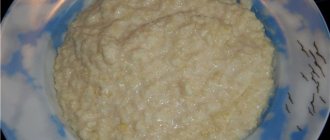You can share the article with friends via social media. networks:
Natural butter is an extremely healthy product for the body. Humans need fats in reasonable quantities, so they should also be supplied to the baby’s body. In the article we will look at the benefits of butter for children, how much of it a baby under one year old needs, as well as much other interesting information.
Although scientists and children's nutritionists cannot decide whether butter is good for children or harmful, the most noteworthy arguments speak in favor of the fact that butter is a useful and even necessary product for the human body.
Benefit
How is butter beneficial for the growing body of a little person who is not yet a year old?
- Source of energy.
The baby, of course, sleeps a lot. But already from 4-5 months the amount of sleep decreases and he begins to be more and more awake. And while awake, the baby never lies quietly. Literally everything moves with him - his arms, legs are constantly in motion, his head is spinning - everything is interesting to him, he is learning about the world. Such vigorous activity, of course, requires a lot of energy. After all, an unformed organism does not yet have the reserves that adults have, so it receives energy with each new meal. But butter is rich in healthy fats, which are transformed in the body into carbohydrates - our main sources of energy.
- Some vitamins necessary for the body dissolve and are absorbed only in a fatty environment.
- Milk fats, which butter is rich in, are absorbed almost completely by the body.
- Lots of vitamins. Including A, D, E, B2. These elements are responsible for vision, help baby's hair grow, make skin healthy, and strengthen bones. And vitamin E is responsible for the proper development of the child’s reproductive organs.
- For problems with the digestive system, butter is necessary.
- Diseases of the respiratory system are also an indicator for the use of this product. These may be diseases of the bronchi and lungs. Even with tuberculosis, if the baby has been suffering from it since birth, butter will help alleviate the situation.
- Helps the body fight skin diseases. Cleanses the skin.
- Milk fat is an essential element for proper metabolism.
- Butter helps a child recover faster after an illness by raising and strengthening the immune system.
- Contains essential and extremely beneficial minerals for the body such as selenium, chromium, zinc, manganese and many others.
- If you managed to get real butter from cows that grazed on pasture, then you have a unique medicine and preventative against cancer in your hands. After all, this oil contains a high content of natural linoleic acid.
- When consumed in reasonable quantities, the product is not stored in fat reserves, but is completely converted into energy.
- The product protects against the development of asthma. It is important that butter enters the body in small quantities, otherwise the benefits can turn into harm. In excess, it harms the heart, clogs blood vessels and negatively affects metabolism, contributing to obesity.
How much butter and vegetable oil should you give your baby?
There are special standards for baby food that describe how much creamy or vegetable product can be given to a child of the first year of life. They look like this:
- The daily norm for babies receiving artificial nutrition is 1 g by 6 months, 3-5 g upon reaching 7 months, 5 g at 8 months.
- The daily portion of the product for children who are breastfed is 1 g starting from 8 months.
When the child turns 9 months old, it is allowed to add 3-5 g of oil to food (without taking into account what the method of feeding the baby was in an earlier period). At 10-12 months, the recommended amount of product per day is 5 g.
As the child develops, the portions of oils in the daily diet should gradually increase. For children from 1 to 3 years old, the norm of a creamy or vegetable product is increased to 6-10 g. After 3 years, the child should receive 10-15 g every day. At this age, butter is not only added to cooked porridge and other dishes, but is also offered to the baby with bread and pastries.
When and how much to give
When should you start giving this healthy product to children under one year old?
From four months, you can easily start adding a little product to the cereals you feed your baby. If you use ready-made porridges from mixtures, then there is no need to add additional oil to their composition - it is already included in the composition of the finished product.
You need to start introducing it little by little - this is the main condition. And after you start giving, carefully monitor the child’s reaction. If negative reactions occur, temporarily stop giving the oil and consult a doctor. But if the child is healthy, then usually there are no problems.
For the first time, children who have not yet turned one year old should be given no more than one gram of oil. And within two months - from the fourth to the sixth - this portion can increase, with a normal child’s reaction, to four grams. By the age of one year, a child can easily master the daily norm of 12 grams.
Of course, you shouldn’t give children under one year the entire daily requirement at once. These 4-12 grams should be divided into several doses - at least two.
Rules for introducing complementary foods
The creamy product is introduced into complementary foods as an addition to a variety of cereals, potato and meat purees, and vegetable broths. When added to these dishes, it will not only improve their taste, but also help better digestion of the starch contained in grains and root vegetables. It should be added not during cooking, but immediately before serving to the child.
Vegetable oil is introduced into the baby's diet first, then butter. This is due to the fact that substances of animal origin are more difficult to digest in most children.
The recommended pause between getting used to such products is about one month. It is important to remember that oils should only have a natural composition. It is prohibited to use low-fat foods, margarine or spreads containing additives of synthetic origin as complementary foods.
When a child’s body masters culinary innovations, it is necessary to constantly monitor the development of a possible negative reaction.
If a child experiences signs of allergies or frequent stools, you will have to temporarily refrain from consuming the oil. Such phenomena are most often associated with a lack of enzymes and imperfections in the digestive system.
How much to give
- At 6 months - from one to four grams.
- 7 months - 4 grams.
- 8 months -5 grams.
- From 9 to 12 months - 6-12 grams.
How to give - useful tips
Since butter is a fairly heavy and fatty product, introducing it into the diet of a baby who is not yet one year old requires great caution. Some doctors advise feeding your baby exclusively with breast milk for up to 6 months, and then starting to introduce other foods. But not all children have the opportunity to drink breast milk until six months. For many mothers, it happens that milk is completely absent or runs out very early. In this case, you can start giving butter from 4 months of age.
It is recommended to give oil after vegetable complementary feeding has already begun and after the baby has first become acquainted with vegetable oil.
- Added to porridge, butter simultaneously increases the digestibility of starch compounds in the cereal and improves the taste of the porridge.
- You should give your baby only exceptionally high-quality, real butter. With 82.5% fat content. The child should not try any spreads, light substitutes or other food waste. Even for adults, the listed products are dangerous, let alone babies. The appearance of such products in a baby’s diet can cause dangerous allergies and poisoning.
- Add fresh butter to the finished porridge, rather than cook it with it.
- If there are problems with the digestive system: stool disorders, colic, then the product should be introduced into his complementary foods with particular caution.
- In order for vitamin A to be fully preserved, the product must be stored covered in the refrigerator.
The importance of oils in a baby's diet
Butter and vegetable oils include:
- fatty acid;
- proteins;
- vitamins;
- amino acids;
- minerals.
Thanks to the entry of such substances into the body, its normal growth and functioning is ensured, digestive processes are normalized, and the immune system is activated. Butter stimulates brain function, promotes the timely formation of teeth and proper bone growth, maintains the necessary level of skin moisture and healthy hair.
Vegetable oils (sunflower, olive, corn) allowed before the child reaches the age of 12 months improve the functioning of the cardiovascular system, participate in the formation of tissues of various organs, maintain the visual organs in normal condition, promote proper coordination of movements, and a timely transition from crawling to walking.
The belated introduction of such products into the baby’s diet or their complete absence is fraught with the appearance of various health problems at an early age, and a lag in physical and mental development.
It is important to take into account that oily substances are a source of cholesterol, an excess of which leads to negative health consequences. That is why they should be present on the children's menu in small, age-appropriate quantities.
How to choose
Nowadays, many people have completely forgotten the real taste of natural butter. What points will tell you that this is a real product without additives:
- Real butter tastes like cream. Without any impurities.
- It doesn't make you sick, it doesn't cause rejection, even if you eat it with a big spoon.
- It practically doesn't freeze. Even after taking the real product out of the freezer, you can spread it on a bun - it will not resemble a small brick in its consistency.
- Doesn't crumble when cut.
- The color is pleasant yellowish, the smell is characteristic.
Recipes for children with added butter
Puree rice porridge with butter
Tasty and nutritious porridge is suitable for children from 6 months.
Compound:
- rice - 1.5 tbsp. spoons;
- water - 200 ml;
- milk - 100 ml;
- butter - 1 teaspoon;
- salt, sugar - a small amount.
Preparation:
- Place the washed rice into boiling water. Cook over low heat for 40 minutes.
- Rub the finished rice through a sieve or grind with a blender until pureed.
- Add hot milk, salt, sugar, bring to a boil.
- Before serving, add butter to the porridge.
Melted butter
Which oil is as healthy as butter, but has a higher digestibility? Of course, baked. This type of product has as many beneficial properties as regular fresh butter. But baked milk is easier to digest and therefore suitable for those children under one year old who are intolerant to lactose and milk protein. Its benefits:
- It has a remarkable effect on the digestive system, relieving the child’s body of colic and constipation.
- Helps develop intellectual abilities by saturating the brain with healthy cholesterol.
- Helps develop and strengthen the reproductive system.
Requirements:
- The consistency of the product should be soft, without hard lumps.
- The color is amber, more/less dark/light.
- The aroma is pleasant, creamy.
- If heated, the natural product does not produce foam or sediment.
Keep in mind that melted butter is an extremely fatty product, so you can give it to a child who is not yet one year old only in the morning.
In butter, after it has been melted, new elements appear, including high-margin fatty acids, which were not present in the original product. These acids are able to remove harmful cholesterol from the body and strengthen blood vessels.
It can be given to a child who has not yet turned one year old - from 4 to 6 grams per day.
You can share the article with friends via social media. networks:
Why is it useful?
Butter is concentrated milk fat. It contains a large amount of vitamins A, D, group B, saturated and polyunsaturated fatty acids.
These substances are required by the body for normal metabolism, hormone synthesis, and the formation of tissues of the nervous system. In addition, the product contains calcium, phosphorus, copper, sulfur and other minerals involved in the construction of new cells.
The benefits of butter for children are undeniable. It ensures the development of the brain and spinal cord, the visual apparatus, maintains the health of the liver and intestines, helps strengthen the tissues of bones and teeth, and reduces the likelihood of inflammatory pathologies of the bronchi and lungs.
This product significantly improves the taste of dishes, is easily digestible, and has a high energy value. Those who love butter are not in danger of physical exhaustion.











